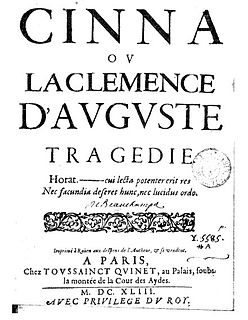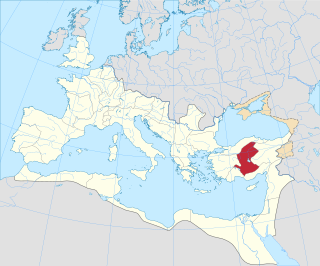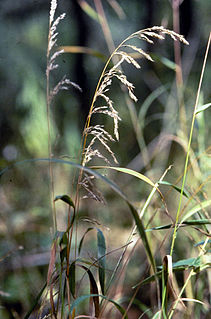
Galatia was an ancient area in the highlands of central Anatolia, roughly corresponding to the provinces of Ankara, Çorum, and Yozgat, in modern Turkey. Galatia was named after the Gauls from Thrace, who settled here and became its ruling caste in the 3rd century BC, following the Gallic invasion of the Balkans in 279 BC. It has been called the "Gallia" of the East, Roman writers calling its inhabitants Galli.

Year 87 BC was a year of the pre-Julian Roman calendar. At the time it was known as the Year of the Consulship of Octavius and Cinna/Merula. The denomination 87 BC for this year has been used since the early medieval period, when the Anno Domini calendar era became the prevalent method in Europe for naming years.
Year 84 BC was a year of the pre-Julian Roman calendar. At the time it was known as the Year of the Consulship of Carbo and Cinna. The denomination 84 BC for this year has been used since the early medieval period, when the Anno Domini calendar era became the prevalent method in Europe for naming years.

Gnaeus Cornelius Cinna Magnus was an ancient Roman politician and the son of suffect consul Lucius Cornelius Cinna and Pompeia Magna. His sister was Cornelia Pompeia Magna.
Gaius Helvius Cinna was an influential neoteric poet of the late Roman Republic, a little older than the generation of Catullus and Calvus.
Gnaeus Octavius was a Roman senator who was elected consul of the Roman Republic in 87 BC alongside Lucius Cornelius Cinna. He died during the chaos that accompanied the capture of Rome by Cinna and Gaius Marius.
Crescens was an individual who appears in the New Testament. He was said to be a missionary in Galatia and became a companion of Paul. The name 'Crescens' is the present-active participle of the Latin word crescere, and means 'increasing'.

Sulla's first civil war was one of a series of civil wars in ancient Rome, between Gaius Marius and Sulla, between 88 and 87 BC. This was also the first in a succession of several internal conflicts, which eventually led to the dissolution of the Roman Republic and establishment of Julius Caesar as dictator.

Amyntas, Tetrarch of the Trocmi was a King of Galatia and of several adjacent countries between 36 and 25 BC, mentioned by Strabo as contemporary with himself. He was the son of Brogitarus, king of Galatia, and Adobogiona, daughter of king Deiotarus Philoromaeus.

Cornelia was the first or second wife of Caesar, and the mother of his only daughter, Julia. A daughter of Lucius Cornelius Cinna, Cornelia was related by birth or marriage to many of the most influential figures of the late Republic.
Orcistus or Orkistos was a city originally in the northeast of ancient Phrygia and later a bishopric in the Roman province of Galatia Secunda, situated south of the town now called Ortaköy and previously Alikel Yaila.
Lucius Cornelius Cinna was the son of the consul Lucius Cornelius Cinna, who was a supporter of politician Gaius Marius. His sister, Cornelia, was the first wife of dictator Julius Caesar and he was the maternal uncle of their daughter Julia Caesaris. Cinna was a member of the illustrious gens Cornelia, who were of patrician status.

Cinna ou la Clémence d'Auguste is a tragedy by Pierre Corneille written for the Théâtre du Marais in 1641, and published two years later. It takes place in ancient Rome, but the ideas and themes characterize the age of Louis XIV, most notably the establishment of royal power over the nobility. A production was laid on in Bayonne in 1660 just before the King arrived for his wedding to the Infanta.

Galatia was the name of a province of the Roman Empire in Anatolia. It was established by the first emperor, Augustus, in 25 BC, covering most of formerly independent Celtic Galatia, with its capital at Ancyra.

The Galatians were a Gallic people of the Hellenistic period that dwelt mainly in the north central regions of Asia Minor or Anatolia, in what was known as Galatia, in today's Turkey. In their origin they were a part of the great migration which invaded Macedon, led by Brennus. The originals who settled in Galatia came through Thrace under the leadership of Leotarios and Leonnorios c. 278 BC. They consisted mainly of three tribes, the Tectosages, the Trocmii, and the Tolistobogii, but there were also other minor tribes. They spoke a Celtic language, the Galatian language, which is sparsely attested.

Germa or Germokoloneia was an ancient and Byzantine city in the Roman province of Galatia Secunda. The Byzantine writer Theophanes informs us that at a later period Germa took the name of Myriangeli. The few archaeological remains lie close to present-day Babadat in Eskişehir Province, Turkey.
The gens Helvia was a plebeian family at Rome. This gens is first mentioned at the time of the Second Punic War, but the only member of the family to hold any curule magistracy under the Republic was Gaius Helvius, praetor in BC 198. Soon afterward, the family slipped into obscurity, from which it was redeemed by the emperor Pertinax, nearly four centuries later.









